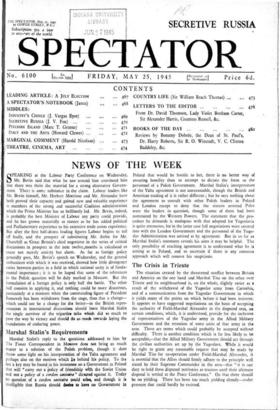The Crisis in Trieste
The situation created by the threatened conflict between Britain and America on the one hand and Marshal Tito on the other over Trieste and its neighbourhood is, on the whole, slightly easier as a result of the withdrawal of the Yugoslav army from Carinthia, and of a communication from the Yugoslav Government in which it yields many of the points on which before it had been insistent. It appears to have suggested negotiations on the basis of accepting the authority of Field-Marshal Alexander in the disputed area, on certain conditions, which, it is understood, provide for the inclusion of representatives of the Yugoslav army in the Allied Military Government and the retention of some units of that army in the area. These are terms which could probably be accepted without difficulty. There is another condition which is far less likely to be acceptable,—that the Allied Military Government should act through the civilian authorities set up by the Yugoslays. While it would be right to grant any reasonable request that may be made by Marshal Tito for co-operation under Field-Marshal Alexander, it is essential that the Allies should firmly adhere to the principle well stated by their Supreme Commander in the area—that " it is our duty to hold these disputed territories as trustees until their ultimate disposal is settled at the Peace Conference." On that there should be no yielding. There has been too much yielding already—under pressure that could hardly be resisted.


























